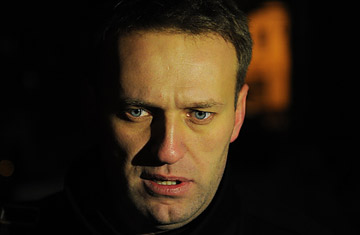
Russian protest blogger Alexei Navalny, a key figure in the rallies after Russia's disputed parliamentary elections, outside a court on Dec. 25, 2011
Of all of Russia's opposition leaders, none have posed a bigger threat to the government of Prime Minister Vladimir Putin than the blogger and activist Alexei Navalny. A lawyer by training and a nationalist by conviction, Navalny, 35, has been at the forefront of the demonstrations that shook awake the Russian body politic last month, bringing tens of thousands of protesters onto the streets of Moscow for the first time since the fall of the Soviet Union. A few days after the third and biggest demonstration on Dec. 24, when Navalny addressed a crowd of 100,000 people in Moscow, TIME's Simon Shuster caught up with him at a courthouse, where he was arguing a case for greater transparency at Russia's largest oil company, Rosneft. He drove back to his office afterward, where he runs a small legal firm, to continue discussing his plans for toppling Putin's government.
Before the recent wave of opposition protests, you were best known as an activist against corruption. But you've said that you had your eye on politics the whole time. How are these two aspects of your work connected?
I've always seen my campaigns against corruption as political work of a purer form than what opposition leaders usually do. All they do is hold roundtables and release political statements, which is all well and good. But there are concrete things that need to get done in order to achieve the basic goal of every opposition politician. That goal is to replace the people in power by putting pressure on the regime. One way to do that is to release political statements and appear on the radio. Another way is to file lawsuits against corrupt state corporations. I take the second approach. And it's very important to carry this through to the end, because my political work needs to always have new substance to it. Everyone needs to understand that my work addresses existing problems, and one of the crucial problems in Russia today is corruption.
Many observers have been quick to compare last month's demonstrations to the Arab Spring. Is this the way you envision it? Will Moscow have a revolution like the one on Kiev's Maidan Square in 2004? The one on Tahrir Square in Cairo last year? Or something else?
What we need is a peaceful scenario. Both Maidan and Tahrir were peaceful. Maidan was absolutely peaceful, Tahrir saw some unrest but was still peaceful on the whole. At this point, the authorities need to understand that they can prevent a Maidan by meeting our demands. If they don't, then we will continue to see peaceful protests in the streets. This is nothing new. Gandhi did it in his day, as did Martin Luther King. It's a time-tested method. The people come out onto the streets. They don't go fighting anyone or burning cars. They just stand there. Humanity has this historical experience of fighting injustice and tyranny. The way to proceed is by using this experience.
Who or what finally brought Russians out onto the streets after years of political apathy?
The mood of defiance brought them out. This is impossible to organize or orchestrate. I can't organize it because the people don't listen to me. When I worked at Yabloko [a liberal political party, where Navalny was an activist between 2002 and '07], we would try to organize a rally and 500 people showed up. But now there is a wave rising. Some people can claim to stand at the cusp of this wave, and yes, they can stand at the podium and address the crowds. But they didn't make this wave. Putin was the one who made this revolution. By falsifying the elections [on Dec. 4], Putin brought these people onto the streets. If he hadn't rigged the [parliamentary vote on Dec. 4] in Moscow, nothing would have happened. But no, they tried to bust through at the joint and ended up insulting so many people that there was a backlash. The people went into the streets. This is a natural reaction for any person. This has been happening for hundreds and thousands of years. They came out and said, 'That's it. No. We don't want this anymore. We want to do things differently.'
